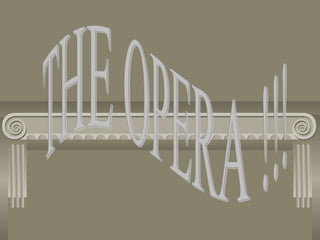What is opera v2
- 3. There are SO MANY parts that make up an opera! Opera is the most extensive and expensive art form today.
- 4. WHAT ARE THE PARTS OF THE OPERA???
- 5. THE LIBRETTO and LIBRETTISTS A strange word for people who have great imaginations and write terrific stories that are made into musical performances.
- 6. THE COMPOSER OH, YEAH! The one that writes the actual music, based on the libretto. Sometimes, he or she will even change the story a bit! He he he
- 7. THE SINGERS The actors and actresses who use their voices to sing the music the composer writes based on the libretto. And yes, it is always memorized.
- 8. THE CHOIR The many actors and actresses that portray large scenes with their voices that were set by the composer based on the libretto. ItˇŻs a group of singers that sing along.
- 9. THE ORCHESTRA A group of musicians that play the music that the composer wrote based on the libretto. Orchestral players are buried in the pit.
- 10. THE CONDUCTOR The BOSS ¨C and donˇŻt you EVER FORGET IT. He or she tells everybody when they sing, play, eat, sleep ¨C well, you get the idea. P.S. DonˇŻt be afraid of the whip. He really uses a baton!
- 11. THE CHOREOGRAPHER The boss of the dancers. He or she stands nervously backstage and gives orders to the dancers.
- 12. THE DANCERS Once in a while, the beautiful and elegant dancers appear on stage. They usually always move in packs, kind of like wolves.
- 13. THE STAGE DIRECTOR This is truly the person who runs the show. Their job is to tell EVERYONE what to do and to worry that none of it will work.
- 14. THE SCENERY AAAHHHHHH!!! The Scenery! Expensive, but beautiful and usually thrown out after the show is over! The artists that make the scenery spend months on it. They have to paint and build and design and decorate and make it look real. But if you look from backstage ¨C it is REALLY AWFUL. There are only bars and metal and wood and canvas.
- 15. THE COSTUMES Costumes are made by professional sewers. First, they draw a picture of what they want, then they pick out fabric and cut it to fit on a mannequin. Then they call in the singers for a try-on. Costumes come in all shapes and sizes! They can be modern or old fashioned.
- 16. An example of costumes for the opera. This one is ˇ°I Pagliacciˇ±.
- 18. This opera is ˇ°La Bohemeˇ±.
- 19. This Operetta (almost like an opera!) is called ˇ°Boccaccioˇ±.
- 20. MAKE-UP The Make-Up artists have lots to do. Sometimes they have to attach beards, or mustaches, or wigs to the singers. Then, they put on the facial make-up, including false eyelashes. YES, THE BOYS WEAR MAKE-UP TOO!!!
- 21. PROPS Down a deep dark tunnel, in a creepy, spooky room are rows and rows and rows of THINGS! Swords, cups, trays, guns, ropes, balls, fireworks ¨C YOU NAME IT. It is the prop room. The props are the items the singers use to make the play look more real.
- 22. LIGHTING The lighting people make sure that the audience can see the action. DonˇŻt EVER make the lighting crew mad, or you may suddenly find yourself singing in the dark!
- 23. CREW The backstage crew makes sure that sets get moved on and off and that the props are in the correct place. The whole show would fail if they werenˇŻt there! Imagine the poor singers pushing around sceneryˇ. I DONˇŻT THINK SO!
- 24. How many pieces of the puzzle can you name??? Composer Singers Choir Orchestra Conductor Choreographer Dancers Stage Director Scenery Costumes Make-Up Libretto Props Lighting Crew
- 25. THE END!!!
- 26. Created by Patty Oeste 2003


























